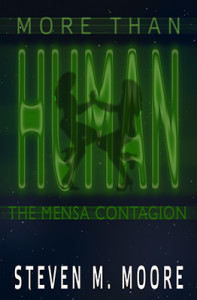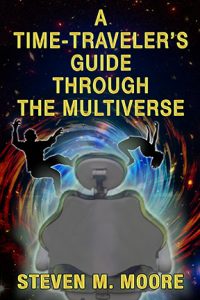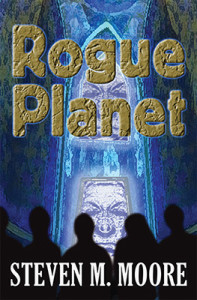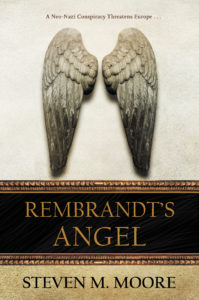Origins…
No, I’m not writing about that first book in A. B. Carolan’s “The Denisovan Trilogy” (he still has to write numbers two and three). Instead, I’d like to discuss how some of my novels originated. In most of my novels, I include endnotes titled “Notes, Disclaimers, and Acknowledgements” where I often discuss the novel’s origins. For the novels I consider here, I’ll add a bit to their correponding endnotes.
 More than Human: The Mensa Contagion. There’s a short sci-fi story (I forget the title—maybe a reader can help me here) where some future astronauts encounter a group of ETs and turn them into mindless dolts by vaccinating them against a virus they’d detected in all of them. (That obviously predates Covid where mindless dolts refuse to vaccinate and a chief mindless dolt recommended injections of disinfectant.) You see, the virus was responsible for making the ETs smart! (Our earthly chief mindless dolt needs that virus!) This is an extreme case of positive symbiosis.
More than Human: The Mensa Contagion. There’s a short sci-fi story (I forget the title—maybe a reader can help me here) where some future astronauts encounter a group of ETs and turn them into mindless dolts by vaccinating them against a virus they’d detected in all of them. (That obviously predates Covid where mindless dolts refuse to vaccinate and a chief mindless dolt recommended injections of disinfectant.) You see, the virus was responsible for making the ETs smart! (Our earthly chief mindless dolt needs that virus!) This is an extreme case of positive symbiosis.
 With hindsight, I think that story might have been the real origin of this novel. The virus in my novel is from the stars and is designed to make Earth more hospitable for ETs on their way to colonize it. (Like in our own exoplanet studies, those ETs have no way of knowing whether intelligent life already exists here, although, as you’ll see in the book, it’s questionable how intelligent life really is here, especially if you consider all the aforementioned Earthly mindless dolts.) Instead, the virus creates Homo Sapiens 2.0, arguably a smarter version.
With hindsight, I think that story might have been the real origin of this novel. The virus in my novel is from the stars and is designed to make Earth more hospitable for ETs on their way to colonize it. (Like in our own exoplanet studies, those ETs have no way of knowing whether intelligent life already exists here, although, as you’ll see in the book, it’s questionable how intelligent life really is here, especially if you consider all the aforementioned Earthly mindless dolts.) Instead, the virus creates Homo Sapiens 2.0, arguably a smarter version.
A Time Traveler’s Guide through the Multiverse. I was never comfortable writing about time travel—most of the stories about it don’t even try to avoid the paradoxes (for example, The Time Traveler’s Wife and that stupid TV series—was it on Starz?). While I enjoyed Heinlein’s Door into Summer, with hindsight I believe that my problems with reading it as a kid made me want to “do time travel right.” This novel is the result. My scientific background made it possible: “The Many Words of Quantum Mechanics” is front and center in this novel, and it was the tool that allowed me to avoid the paradoxes, but the characters provided all the fun.
 Rogue Planet. While I promoted this book as a hard sci-fi version of Game of Thrones, which of course is pure fantasy, I believe the book’s true origin lies with my negative reaction to the first Star Wars movie seen so long ago that I never imagined I’d be writing anything other than scientific papers. (I believe I took my little daughter to see it—she’s a lot older now! It probably affected her a lot differently than it did me.) ILM’s creation is also pure fantasy, not hard sci-fi. Light sabers? C’mon! The Force? Please! I had to create an answer to all that nonsense by writing a novel that did things right. I did…after quite a few years.
Rogue Planet. While I promoted this book as a hard sci-fi version of Game of Thrones, which of course is pure fantasy, I believe the book’s true origin lies with my negative reaction to the first Star Wars movie seen so long ago that I never imagined I’d be writing anything other than scientific papers. (I believe I took my little daughter to see it—she’s a lot older now! It probably affected her a lot differently than it did me.) ILM’s creation is also pure fantasy, not hard sci-fi. Light sabers? C’mon! The Force? Please! I had to create an answer to all that nonsense by writing a novel that did things right. I did…after quite a few years.
 Of course, there are no dragons in this novel a la Game of Thrones nor any real magic, just an evil theocracy modeled after the worst evil theocracy this world has ever seen, Iran, with some ISIS flavor added. (I wrote it before MBS reached puberty—has he ever managed that?—so I couldn’t use that murdering SOB as a model for the evil leader of the theocracy. Of course, in the eyes of Allah, MBS is the equivalent of dog feces.)
Of course, there are no dragons in this novel a la Game of Thrones nor any real magic, just an evil theocracy modeled after the worst evil theocracy this world has ever seen, Iran, with some ISIS flavor added. (I wrote it before MBS reached puberty—has he ever managed that?—so I couldn’t use that murdering SOB as a model for the evil leader of the theocracy. Of course, in the eyes of Allah, MBS is the equivalent of dog feces.)
Rembrandt’s Angel. The origins for this novel hark back to my long stay in the Beantown area. I doubt that many readers have visited the Isabel Stuart Gardner Museum where that huge art heist occurred. (The FBI has never been able to solve that case.) Long before the film Monuments Men (probably a good book as well—I need to read it), this student of history knew that the Nazis had stolen many paintings during WWII, a lot of them from Jews—and you know where most of those paintings were sent! Some have been recovered and returned to the surviving relatives (if there are any). The Rembrandt painting in the novel is real, and it’s never been recovered, so never returned, as mentioned in the novel’s endnotes.
My wondering as a lad about why Dame Agatha had never put Miss Marple and Hercule Poirot together to solve a complex case was also a motivation…and led to the novel, again after a long wait. But that Beantown art heist left an impression on me and taught me plenty about the scurrilous people who steal art and sell it to rich collectors who take pride in having something no one else can see and enjoy.
Do you read endnotes? Do you even care about a book’s origins? I reluctantly accept “no” as an answer to both questions. You don’t need the origins to enjoy the stories, but maybe you’d enjoy them more if you did!
***
Comments are always welcome. (Please follow the rules on the “Join the Conversation” web page. If you don’t, your comment will be considered spam.)
 Come globe-trot with me! Three evergreen novels from three different series will take you, the reader, to many different countries. Aristocrats and Assassins (UN52Q) finds Detective Castilblanco and his wife on an European vacation that becomes deadly. Why is a terrorist kidnapping Europe’s royals? In Death on the Danube (AR72S), you’ll cruise down that famous river along with Esther Brookstone and Bastiann van Coevorden on their honeymoon voyage…right into danger, as the two sleuths try to find a murderer. And in Muddlin’ Through (TV85M), you can go along on a dangerous tour with Mary Jo Melendez around Europe and South America as she tries to prove she was framed for her sister and brother-in-law’s murder and tries to save the MECHs (“Mechanically Enhanced Cybernetic Humans”). All these globe-trotting adventures that will leave you breathless and asking for more are on sale now at Smashwords for only 99 cents. (Use the indicated promo codes if you don’t see that price.) Sale ends August 31. Bon voyage!
Come globe-trot with me! Three evergreen novels from three different series will take you, the reader, to many different countries. Aristocrats and Assassins (UN52Q) finds Detective Castilblanco and his wife on an European vacation that becomes deadly. Why is a terrorist kidnapping Europe’s royals? In Death on the Danube (AR72S), you’ll cruise down that famous river along with Esther Brookstone and Bastiann van Coevorden on their honeymoon voyage…right into danger, as the two sleuths try to find a murderer. And in Muddlin’ Through (TV85M), you can go along on a dangerous tour with Mary Jo Melendez around Europe and South America as she tries to prove she was framed for her sister and brother-in-law’s murder and tries to save the MECHs (“Mechanically Enhanced Cybernetic Humans”). All these globe-trotting adventures that will leave you breathless and asking for more are on sale now at Smashwords for only 99 cents. (Use the indicated promo codes if you don’t see that price.) Sale ends August 31. Bon voyage!
Around the world and to the stars! In libris libertas!
